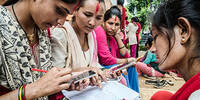GET INVOLVED IN WAAW this year!
The theme for WAAW 2023 will be the same as 2022: "Preventing antimicrobial resistance together." Antimicrobial resistance (AMR) poses a threat to humans, animals, plants, and the environment, and it affects everyone. This year's theme emphasizes the need for a One Health approach involving multiple sectors to preserve the efficacy of antimicrobials. Addressing AMR requires collective efforts from all levels of society, as the main drivers of AMR are the misuse and overuse of antimicrobials. Therefore, adopting a whole-of-society and multi-sectoral approach is essential to address this global issue effectively.
How to participate
Get involved in one or more of the following ways and encourage your network to do so! If you organize an activity, virtually or in person, let us know!
- Go Blue for AMR awareness: Go Blue (wear light blue when participating in WAAW events; adjust your social media profiles to blue and share why you are Going Blue with friends, family, colleagues, and on social media).
- Target the top: Write to your elected representatives and let them know your concerns about the threat of AMR. Have you piqued their interest? Ask them to talk to you and your colleagues about your country's priorities for the United Nations General Assembly High-Level Meeting on AMR in 2024.
- Reach out to the media: Share key messages by participating in panel discussions and media briefings. Invite journalists to cover your events and activities to get more people to participate.
- Engage and collaborate with young AMR Champions in your area: Work with your local school administration to hold a special school assembly on AMR.
- Use the WAAW visuals: Visual reminders to handle antimicrobials with care are a great way to start conversations and raise awareness of current AMR challenges – check out this Trello board for ideas.
What can we do to help reduce the need for antimicrobials and minimize the emergence of AMR?
-

Strengthen infection prevention and control in health facilities, farms and food industry premises.
-

Ensure access to clean water, sanitation and hygiene, and vaccines.
-

Implement best practices in food and agricultural production.
-

Minimize pollution and ensure proper waste and sanitation management.
Key messages
Good husbandry practices, biosecurity, sanitation, hygiene, vaccination and other infection prevention measures are essential to reduce the need for antimicrobials in animals and antimicrobial pesticides in plants. |
The use of Integrated Pest Management and good agricultural practices provides a system-wide approach to keeping crops healthy, resorting to chemical pesticides, including antimicrobials, only as a last option. |
Scientific knowledge and science-based evidence are needed to identify, manage and mitigate AMR risks before they become large-scale emergencies. |
|
Laboratory diagnostic and sensitivity tests are essential for the detection of AMR. They guide therapeutic treatments to save human and animal lives. They also play a key role in surveillance efforts to design successful interventions to reduce AMR in humans, animals, plants and the environment. |
|







